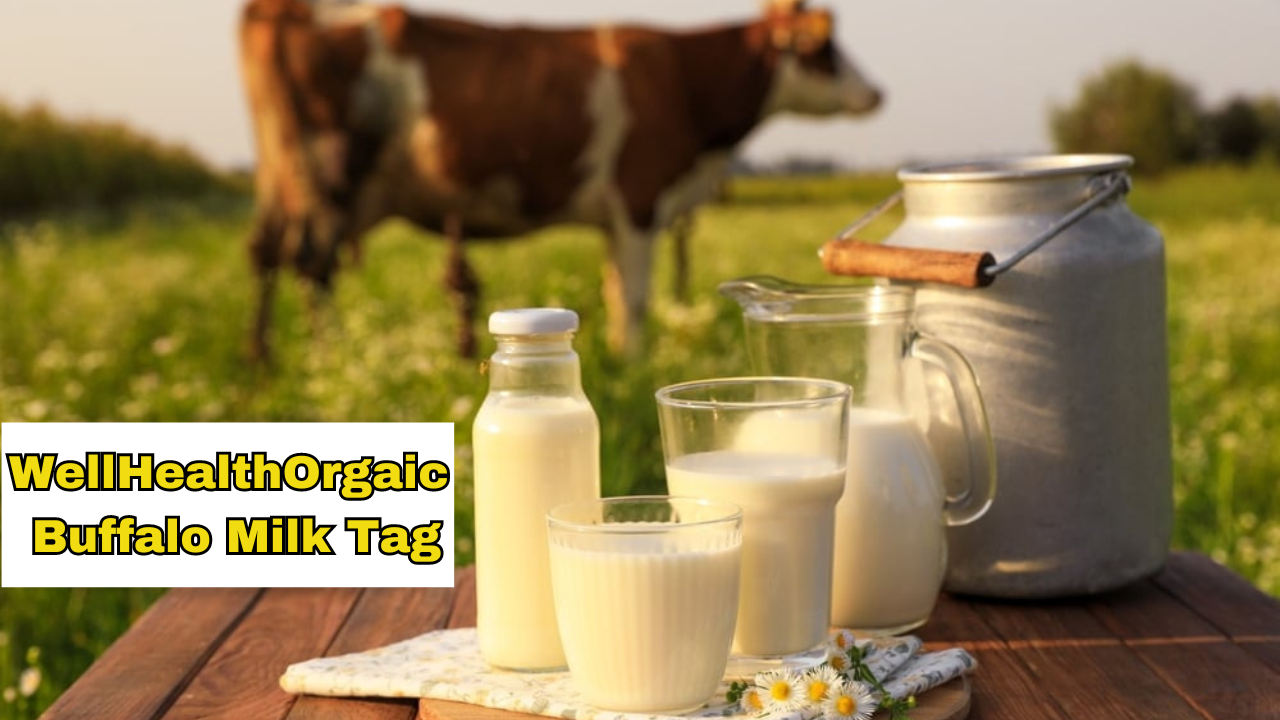Introduction to WellHealthOrganic Buffalo Milk Tag
WellHealthOrganic Buffalo Milk Tag is often overshadowed by its more commonly consumed counterpart, cow milk. However, this nutrient-dense dairy product deserves its own spotlight. Renowned for its rich taste and creamy texture, buffalo milk is a staple in many traditional diets around the world. It offers a unique nutritional profile that can significantly contribute to a balanced diet. In this article, we’ll explore the myriad health benefits of WellHealthOrganic Buffalo Milk Tag, how it compares to cow milk, and why it might be a superior choice for many people.
The Nutritional Profile of Buffalo Milk Tag
Buffalo milk boasts a robust nutritional profile that sets it apart from other types of milk. It is richer in fats, proteins, and minerals, making it an excellent source of essential nutrients. For instance, buffalo milk contains higher levels of calcium, magnesium, and phosphorus, which are crucial for maintaining healthy bones and teeth. Additionally, it is packed with vitamins such as A, D, and B12, contributing to overall health and well-being. The high protein content in buffalo milk supports muscle growth and repair, making it a great option for athletes and those looking to build muscle mass.
Health Benefits of Buffalo Milk Tag
One of the standout benefits of buffalo milk is its ability to boost the immune system. The rich concentration of vitamins and minerals helps fortify the body’s natural defenses, making it more resilient against infections and diseases. WellHealthOrganic Buffalo Milk Tag is also known for its anti-inflammatory properties, which can help reduce the risk of chronic diseases such as heart disease and arthritis. Moreover, the high levels of antioxidants in buffalo milk contribute to its health benefits by neutralizing harmful free radicals in the body.
Buffalo Milk vs. Cow Milk: A Comparison
When comparing buffalo milk to cow milk, several differences become apparent. Buffalo milk contains more fat and calories, which can be beneficial for those needing extra energy or trying to gain weight. It also has a higher concentration of protein, making it more suitable for muscle development. Furthermore, buffalo milk has lower cholesterol levels than cow milk, which can be advantageous for heart health. Its thicker consistency and richer taste make it a preferred choice in various culinary applications, from making cheese to creamy desserts.
Buffalo Milk Tag for Lactose Intolerant Individuals
For individuals who are lactose intolerant, buffalo milk can sometimes be easier to digest than cow milk. While it still contains lactose, the structure of its proteins and the presence of certain enzymes might aid in better digestion for some people. However, it’s important to consult with a healthcare provider before making any dietary changes, especially if you have severe lactose intolerance.
The Role of Buffalo Milk Tag in Traditional Diets
Buffalo milk has been a crucial component of traditional diets in many cultures, particularly in South Asia and the Mediterranean region. It is often used to make yogurt, cheese, and other dairy products, which are integral to these cuisines. The nutritional density of buffalo milk makes it a valuable food source, providing essential nutrients to populations where other sources might be limited.
Buffalo Milk Tag and Heart Health
Buffalo milk can contribute positively to heart health due to its favorable lipid profile. Despite its higher fat content, the types of fats present in buffalo milk are healthier. It contains more monounsaturated and polyunsaturated fats, which are known to reduce bad cholesterol levels and increase good cholesterol levels. This balance helps in maintaining heart health and reducing the risk of cardiovascular diseases.
How Buffalo Milk Supports Bone Health
The high calcium content in buffalo milk is a well-known benefit, essential for strong bones and teeth. Additionally, the presence of phosphorus in buffalo milk works synergistically with calcium to enhance bone density and prevent osteoporosis. For growing children and elderly individuals alike, including buffalo milk in the diet can help maintain and improve bone health.
The Impact of Buffalo Milk Tag on Skin Health
Buffalo milk is rich in vitamins A and E, which are vital for skin health. Vitamin A helps in skin repair and regeneration, while vitamin E provides moisturizing benefits and protects the skin from oxidative stress. Regular consumption of buffalo milk can contribute to a glowing complexion and improved skin texture. Additionally, using buffalo milk topically, as in traditional beauty treatments, can also offer skin-soothing benefits.
Buffalo Milk for Muscle Growth and Recovery
Athletes and fitness enthusiasts can benefit greatly from the high protein content in buffalo milk. Proteins are the building blocks of muscles, and consuming buffalo milk post-workout can aid in muscle repair and recovery. The amino acids present in buffalo milk help in muscle synthesis, making it a valuable addition to the diet of anyone looking to build or maintain muscle mass.
Buffalo Milk in Ayurvedic Medicine
In Ayurveda, buffalo milk tag is valued for its cooling properties and its ability to balance certain doshas (body energies). It is often recommended for people with a Pitta (fire) constitution due to its calming and nourishing effects. Ayurvedic practitioners use buffalo milk in various formulations to treat ailments such as insomnia, digestive issues, and certain skin conditions, highlighting its multifaceted benefits.
Organic Buffalo Milk: Why It Matters
Choosing organic buffalo milk tag can enhance the health benefits you receive. Organic milk is produced without the use of synthetic pesticides, fertilizers, or antibiotics, making it a cleaner and more environmentally friendly option. Organic farming practices also ensure better animal welfare, leading to healthier and happier buffaloes, which in turn produce higher quality milk.
Buffalo Milk for Children: Nutritional Benefits
Children require a nutrient-rich diet to support their rapid growth and development. Buffalo milk tag provides an excellent source of calcium, protein, and essential vitamins, making it a great addition to a child’s diet. Its rich nutritional profile supports bone growth, boosts the immune system, and aids in overall physical and cognitive development.
Buffalo Milk and Weight Management
Contrary to popular belief, the higher fat content in buffalo milk can actually support weight management. The fats and proteins in buffalo milk promote satiety, helping you feel fuller for longer and reducing overall calorie intake. This can be particularly beneficial for those looking to manage their weight effectively without sacrificing nutritional intake.
The Role of Buffalo Milk in Sustainable Agriculture
Buffalo milk production can play a significant role in sustainable agriculture. Buffaloes are hardy animals that can thrive in various climates, requiring less intensive farming practices compared to cows. This makes buffalo farming more sustainable and environmentally friendly. Additionally, buffaloes contribute to biodiversity and the preservation of traditional farming practices, supporting agricultural sustainability.
Potential Allergies and Sensitivities to Buffalo Milk
While buffalo milk tag is generally well-tolerated, it is important to be aware of potential allergies and sensitivities. Some individuals might be allergic to the proteins in buffalo milk, leading to symptoms such as gastrointestinal discomfort, skin rashes, or respiratory issues. If you have a known dairy allergy, it is advisable to consult with a healthcare provider before incorporating buffalo milk into your diet.
Incorporating Buffalo Milk into Your Diet
Buffalo milk tag can be enjoyed in a variety of ways, from drinking it plain to using it in recipes. It can be used to make rich and creamy yogurts, cheeses, and even desserts like panna cotta. Incorporating buffalo milk into your daily diet can be as simple as adding it to your morning coffee or cereal, or using it as a base for smoothies and shakes.
Buffalo Milk for Pregnant and Breastfeeding Women
Buffalo milk tag can be a valuable addition to the diet of pregnant and breastfeeding women, providing essential nutrients that support both maternal and fetal health. The high levels of calcium, protein, and vitamins in buffalo milk can help meet the increased nutritional demands during pregnancy and lactation. However, it is always best to consult with a healthcare provider to ensure it aligns with your specific dietary needs.
Buffalo Milk as a Functional Food
Functional foods provide health benefits beyond basic nutrition, and buffalo milk tag fits this category perfectly. Its rich content of bioactive compounds, such as conjugated linoleic acid (CLA) and antioxidants, contribute to its health-promoting properties. Regular consumption of buffalo milk can support various aspects of health, from enhancing immune function to reducing inflammation.
Buffalo Milk in Modern Culinary Trends
Buffalo milk tag is gaining popularity in modern culinary trends, particularly in gourmet cooking. Its rich flavor and creamy texture make it a favorite among chefs for creating luxurious dishes. From artisanal cheeses to decadent desserts, buffalo milk is being used innovatively in kitchens around the world, adding a touch of indulgence to various recipes.
The Future of Buffalo Milk in the Dairy Industry
The dairy industry is seeing a growing demand for buffalo milk and its products. As consumers become more health-conscious and seek out nutrient-dense foods, buffalo milk’s popularity is expected to rise. Innovations in buffalo milk processing and product development are likely to expand its market presence, making it more accessible to a wider audience.
How to Choose High-Quality Buffalo Milk Products
When selecting buffalo milk tag products, it’s essential to choose high-quality options. Look for organic certifications and reputable brands that prioritize animal welfare and sustainable farming practices. Reading labels and understanding the source of your buffalo milk can help ensure you are getting a product that is both nutritious and ethically produced.
Buffalo Milk-Based Products: A Growing Market
The market for buffalo milk tag -based products is expanding rapidly. From buffalo mozzarella to yogurt and ghee, there is a wide range of products available for consumers. These products not only offer the nutritional benefits of buffalo milk but also cater to the growing demand for unique and artisanal dairy options.
The Environmental Impact of Buffalo Milk Production
Buffalo milk production can have a lower environmental impact compared to cow milk production. Buffaloes are more efficient in converting feed into milk and can thrive on less intensive farming practices. This contributes to lower greenhouse gas emissions and a reduced carbon footprint, making buffalo milk a more sustainable choice for environmentally conscious consumers.
Conclusion
Buffalo milk is a nutrient-dense dairy product that offers numerous health benefits. From supporting bone health to boosting the immune system, its rich nutritional profile makes it a valuable addition to any diet. With its growing popularity in both traditional and modern culinary applications, buffalo milk is set to become a staple in households around the world. Whether you are looking for a healthier alternative to cow milk or seeking to explore new culinary delights, buffalo milk is worth considering. Embrace the benefits of this creamy, nutrient-rich milk and enjoy its positive impact on your health and well-being.
FAQs about Buffalo Milk
What are the main nutritional benefits of WellHealthOrganic Buffalo Milk Tag?
Buffalo milk is rich in proteins, fats, vitamins, and minerals. It offers higher levels of calcium, magnesium, and phosphorus compared to cow milk, making it excellent for bone health. It also contains essential vitamins like A, D, and B12, which contribute to overall health.
Is buffalo milk suitable for lactose-intolerant individuals?
While buffalo milk contains lactose, some people with lactose intolerance find it easier to digest due to its protein structure and enzyme content. However, it’s best to consult with a healthcare provider if you have severe lactose intolerance.
How does buffalo milk compare to cow milk in terms of fat content?
Buffalo milk has a higher fat content than cow milk, which contributes to its creamier texture and richer taste. Despite this, the fats in buffalo milk are considered healthier, with a favorable balance of monounsaturated and polyunsaturated fats.
Can children benefit from drinking WellHealthOrganic Buffalo Milk Tag?
Yes, children can benefit from the high nutritional content of buffalo milk. It provides essential nutrients like calcium, protein, and vitamins that support growth and development.
Is organic buffalo milk better than regular buffalo milk tag?
Organic buffalo milk is produced without synthetic pesticides, fertilizers, or antibiotics, making it a cleaner and more environmentally friendly option. It also supports better animal welfare, leading to higher quality milk.
What are some common uses of buffalo milk tag in cooking?
Buffalo milk is used to make a variety of dairy products such as mozzarella, yogurt, butter, and ghee. It is also used in desserts like panna cotta and can be incorporated into recipes for its rich and creamy texture.





